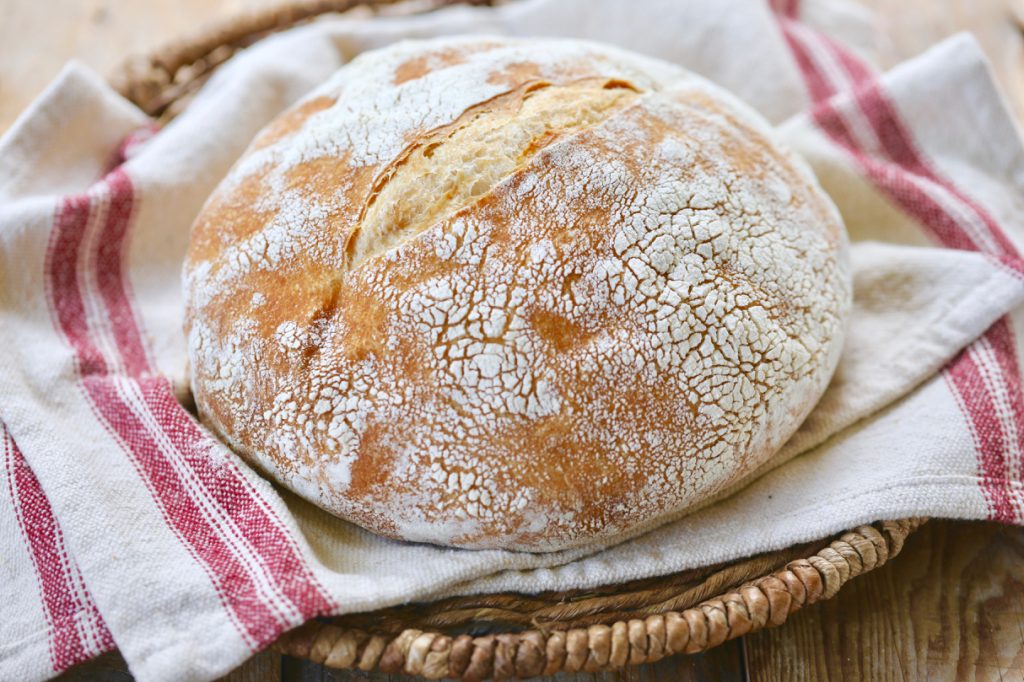Sourdough bread is a popular choice for many people, but many don’t know what it contains or how it’s made. One of the most common questions about sourdough bread is whether it contains eggs or not. To answer this question, let’s take a closer look at the ingredients used in sourdough recipes and how they are prepared.

Table of Contents
Ingredients Used to Make Sourdough Bread
The exact ingredients used in any recipe depend on the type of sourdough bread being made. However, there are some core ingredients that are commonly used in all types of sourdough bread recipes. These include flour, water, and salt.
A starter culture can also be added to give the dough its signature tangy flavor. The starter culture is usually made up of bacteria and yeast that have been allowed to ferment natural sugars present in flour over time.
Does Sourdough Bread Contain Eggs?
Sourdough does not typically contain eggs; however, eggs can be added as an optional ingredient for flavor or texture purposes. It’s important to note that adding eggs will change both the texture and taste of the finished product so it may be best to avoid them if you’re wanting an authentic sourdough loaf.
In addition, if you’re looking for a vegan-friendly option, you should look for a recipe that does not contain eggs as they are derived from animal products.
How Does This Affect Its Nutritional Content?
Eggs can add nutrition to your diet such as protein and healthy fats; however, excluding eggs from your recipe won’t greatly affect its nutritional content since other key ingredients like flour still remain intact.
Furthermore, since eggs often add richness and flavor to baked goods without significantly changing their nutritional content, omitting them will only marginally reduce their nutrient value overall.
Read more:
The Truth About Convection Vs Toaster Ovens: How the Latter Wins Every Time

FAQs
Can dogs eat sourdough bread?
Yes, dogs can eat sourdough bread in moderation.
Sourdough is made with a starter culture of wild yeast and bacteria, which provides beneficial probiotics to the bread. If fed in moderation and as a treat, sourdough can form part of a healthy diet for dogs.
However, it is important to note that some sourdough breads have added sugar or other ingredients which can be harmful for dogs, so always check the ingredients list before feeding it to your pet.
Sourdough bread can also contain salt, so be mindful of giving too much as this could cause sodium poisoning in dogs. It is always best to check with your vet before introducing any new foods into your pet’s diet.
Finally, make sure that any sourdough bread you give your dog is fully cooked as raw dough can cause bloating and other digestive issues. If you decide to feed sourdough bread to your dog, make sure it’s only a small portion of their overall diet.
A balanced diet with plenty of fresh food, water, and exercise is the best way to keep your dog healthy.
Is sourdough bread vegan?
Sourdough bread is typically vegan, as it only contains flour, water, salt and sourdough starter. These ingredients are all vegan-friendly, so sourdough bread can be enjoyed as part of a vegan diet.
However, it is important to check the ingredients list when buying sourdough bread to make sure that no animal products have been added.
Oils and sweeteners such as honey are sometimes added to commercial sourdough breads, which would make them non-vegan. Additionally, some bakeries use animal fat to grease their baking tins or add dairy-based ingredients like butter or eggs to their breads. Therefore, always check the label before buying sourdough bread.

How long does sourdough bread last?
Sourdough bread typically lasts longer than other types of bread due to the presence of lactic acid bacteria, which produce acids that act as preservatives.
Properly stored, sourdough bread can stay fresh for up to two weeks when refrigerated, or up to three months when stored in the freezer. It’s best to store sourdough bread in an airtight container so that it doesn’t become stale quickly.
If you want to prolong the shelf life of your sourdough bread, you can toast it prior to eating or freezing it. Toasting will help lock in moisture and reduce the likelihood of mold growth.
Additionally, it’s best to use up sourdough bread within a few days after baking as the flavor and texture can change over time.
Conclusion
In conclusion, traditional sourdough recipes do not require eggs; however, they can be added if desired for additional flavor or texture purposes. It is important to note that adding eggs will change both the texture and taste of the finished product so it may be best to avoid them if you’re wanting an authentic sourdough loaf. Additionally, if you’re looking for a vegan-friendly option then look for a recipe that does not contain any animal-based products such as eggs or dairy products. Ultimately though, excluding eggs from your recipe won’t significantly impact its nutritional content due to other key ingredients like flour still remaining intact regardless of egg inclusion or exclusion.
Ref:
https://en.wikipedia.org/wiki/Sourdough
https://cooking.nytimes.com/guides/59-how-to-make-sourdough-bread








